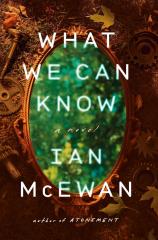What We Can Know
Review
What We Can Know
Tom Metcalfe, a literary academic in the year 2119, specializes in the period from 1990 through 2030, particularly the work of renowned poet Francis Blundy and his wife, Vivien.
As Tom travels to study their journals and papers, we realize that most of the world we know now is under water. He returns again and again to a dinner party for Vivien in 2014, held at their home in the Cotswolds. Thanks to technology, he has access to emails and text messages to and from the dinner guests, but there is no trace of the poem composed by Francis for Vivien. “A corona was a formidable undertaking. This one consisted of fifteen sonnets. The last line of each had to be repeated in the first line of the next.”
The subject of WHAT WE CAN KNOW is essentially a missing poem, and the primary stakes are whether or not it will ever be found. “The issue was not a lost birthday poem read after dinner, it was what the poem by its non-existence had become: a repository of dreams, of tortured nostalgia, futile retrospective anger and a focus of unhinged reverence.”
"Like every McEwan novel, this one is tightly constructed and skillfully written.... WHAT WE CAN KNOW is an entertaining and thought-provoking gift from a writer at the top of his game."
Tom’s partner Rose, an academic herself, understands his obsession even as it frustrates her. They share one of those couple jokes that is not really a joke --- that Tom is in love with Vivien, a complicated lady who has been dead for a hundred years. Why would a woman, a scholar and professor, essentially give up her career to move to the Cotswolds with an aging poet? One clue might be the harrowing years she spent tending to her previous husband Percy, a violin maker who suffered from Parkinson’s. In any case, when Tom gets a clue as to the whereabouts of some undiscovered papers --- the corona? --- he and Rose embark on a watery journey to find them.
As Part I unfolds, we puzzle out what the heck happened to our world. Ian McEwan has been quoted as describing this book as “science fiction without the science.” The Derangement refers to our attempts to come to terms with and possibly avoid global catastrophe from climate change. The Inundation in 2042 kills millions, with its global tsunamis and floods caused by an errant Russian nuclear bomb, but some humans prove resilient enough to survive. At the University of South Downs, where Tom and Rose teach, the Humanities are a poor cousin to Science and Technology. Yet on each computer, there is access to a mountain of material for those students without science or math talent. “Every song, lie, casual thought, opera performance, death threat, punk-band riot --- all of it, more than 120 years of the collective human mind rescued for our perusal.”
Like every McEwan novel, this one is tightly constructed and skillfully written. Language lovers will treasure sentences like these: “Jane entered the well-trodden labyrinth of fondness and resentment towards her brother, one she could never escape.” “I went towards him as I would a pile of dirty dishes.” “A fiend had come in the night to take an ice-cream scoop to my brain and made off with my darkest emotional flavours, fury, humiliation, self-pity, desolation.”
Part II of the novel has a different narrator, one from the cast of characters we’ve come to know through Tom’s studies, but revealing their identity is a spoiler I won’t indulge. It’s a fascinating world of intrigue, jealousy and dark passions. WHAT WE CAN KNOW is an entertaining and thought-provoking gift from a writer at the top of his game.
Reviewed by Eileen Zimmerman Nicol on September 26, 2025
What We Can Know
- Publication Date: September 23, 2025
- Genres: Dystopian, Fiction, Romance, Science Fiction
- Hardcover: 320 pages
- Publisher: Knopf
- ISBN-10: 0593804724
- ISBN-13: 9780593804728




